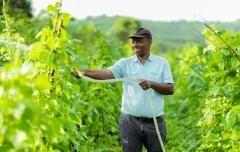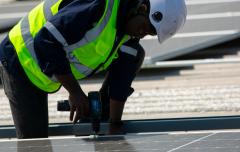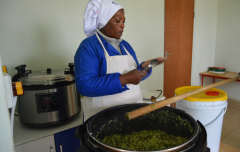Partner Spotlight: Practical Action highlights energy exclusion for women
In honor of International Women’s Month, SEforALL interviewed People-Centered Accelerator partners about their efforts to promote gender equality, social inclusion and women’s empowerment in the energy sector. In this interview, Lucy Stevens, Senior Energy Access Adviser at Practical Action, discusses the organization’s work in achieving these goals.
Tell us about Practical Action. What areas do you focus on?
Practical Action is an international development organisation that puts ingenious ideas to work so people in poverty can change their world.
Practical Action helps people find solutions to some of the world’s toughest problems, including challenges made worse by climate change and gender inequality. It works with communities to develop ingenious, lasting and locally owned solutions for agriculture, water and waste management, climate resilience and clean energy. And it shares what works with others, so answers that start small can grow big.
Practical Action is a global change-making group. It consists of a UK registered charity with community projects in Africa, Asia and Latin America, an independent publishing company and a technical consulting service. It combines these specialisms to multiply its impact and help shape a world that works better for everyone.
Practical Action believes in the power of small to change the big picture. And that together we can take practical action to build futures free from poverty.
How does Practical Action support increasing energy access?
We have work on the ground in Africa, Latin America and South Asia covering a wide spectrum of electricity and clean cooking initiatives. Increasingly our role as an NGO is to empower and enable better delivery by others. That might mean supporting mini-grid companies to work on productive uses, empowering women energy entrepreneurs, or supporting energy access in humanitarian settings.
We champion the voices of energy-poor communities in shaping national policy priorities, and are a founding member of the ACCESS Coalition bringing civil society together nationally and globally. We have helped bring stakeholders together to catalyze energy markets in practical ways with the Power for All consortium and, in the humanitarian sector, work with a diverse range of actors to improve energy access among displaced people through a Global Plan of Action.
Importantly, we aim to share what works with others. We do this through our long-standing technical enquiries work (Practical Answers) and publishing company, who produce books, journals and reports geared to practitioner and academic audiences.
You are a People-Centered Accelerator (PCA) partner. Why is a platform focused on gender equality, social inclusion and women’s empowerment necessary in the energy sector?
These issues are often tackled last or not at all. Too often energy policies fail to address gender issues and many large-scale programs simply assume women and men will benefit equally, which is not the case. We know from decades of experience on the ground that universal energy access and gender equality are mutually reinforcing. Enabling women in energy value chains benefits communities, businesses, women themselves and their families. We have a long-standing partnership with Energia, and in Kenya have worked to mainstream gender in energy at local and national levels, recognizing the need to build decision-makers’ capacity on this important issue.
Beyond gender, social inclusion must be considered from the outset to ensure the poorest and most remote are no longer excluded from energy and its transformational impacts.
The PCA convenes like-minded organizations, creating momentum and space to champion issues of social inclusion and women’s empowerment at the highest levels, making sure we maximize the collective impact of members’ work.
One of Practical Action’s key contributions to the PCA has been its series of Poor People’s Energy Outlook reports. Why is this important and what are its lessons?
The Poor People’s Energy Outlook (PPEO) series, launched in 2010, champions energy poor communities’ perspectives and challenges decision-makers to change their approach to energy access. That includes focusing on energy services rather than supplies; and thinking about “total energy access” for households, productive uses and community services. It means raising the profile of clean cooking to receive the same, if not more, attention, finance and political will as electrification. Some of this thinking has become mainstream and been embedded in, for example, the multi-tier framework for measuring energy access.
In recent editions we turned our attention to implementation, covering people-centred planning, financing and delivery. Critical to the PPEO series’ value and credibility is our bottom-up approach involving rich, primary research drawing on first-hand perspectives from all stakeholders from community members to national policymakers.
We were delighted to join forces with the PCA this year on a webinar to share the PPEO 2018 with a global audience. The report asks how we can reach more people with energy access, while also leaving no one behind. Our analysis of a range of programs highlighted the need to proactively and deliberately tackle questions of inclusion, and to find ways of measuring and valuing inclusion just as much as numbers of households connected. Too often these issues are addressed as an afterthought when they should be center stage from the beginning.
Besides producing the report, we work to engage a wide range of decision-makers at national and global levels about its findings and implications. We hold stakeholder dialogues to test ideas, and deliver a range of communications activities to allow decision makers to engage with the findings, and consider how they can use them in their own work.
The full report and short summary in English are available online now (French and Spanish translations coming soon!). We’ll be kick-starting national level discussions over the coming months, so we encourage those interested to get in touch with us.
What plans does Practical Action have for 2019?
With the PPEO we will be collating the last three editions, producing a compilation giving an overarching perspective on bottom-up energy access planning, financing and delivery. We are actively planning the next phase of the work.
In other work, you’ll be hearing more from the Global Distributors Collective as they bring last-mile companies together and produce a “State of the Sector” report. We’re also rolling-out the delivery phase of our work in long-established refugee camps in Rwanda under our humanitarian energy programme. With Hivos/ENERGIA, Power for All and SNV, we are ramping up activities to accelerate decentralized renewable energy markets in 25 countries by 2025, under the 25x25 Collaborative. We will apply similar lessons to advancing markets for clean cooking, including through empowering women entrepreneurs and engaging with results-based financing models across five countries. We are interested in new innovations, including exploring the potential for e-solar cooking in Bangladesh.
One of our biggest programs on the ground focusing on solar and hydro-powered mini-grids linked with agricultural livelihoods in Zimbabwe and Malawi will be ending its current phase. This work on the energy-water-agriculture nexus with a markets-based focus has become a strong part of our niche, and we aim to document that further this year.
Crucial to delivering these plans will be our strong partnerships and alliances. We continue to seek and strengthen our collaborations with a range of actors, from the private sector to financiers and beyond – and look forward to working closely with the PCA and its members on upcoming initiatives.
How does Practical Action partner with SEforALL?
We have worked with SEforALL from the very beginning; previously participating on the Energy Access Committee and serving on the SEforALL Forum's steering committees in 2014 and 2015. We worked closely with them in Kenya, Zimbabwe, Nepal and Rwanda; and Nigeria and Sierra Leone through our involvement in Power for All. We have also collaborated on publications, for instance “Taking the Pulse” in the Energizing Finance series. We currently co-lead the PCA workstream on scaling up sustainable access pathways for the most vulnerable and hardest-to-reach groups.
SEforALL consistently champions issues that are important to us, and we will continue to use our engagement with them to ensure the voices of civil society (from the South as much as the North) are listened to and acted on in global debates.
Photo credit: Edoardo Santangelo / Practical Action




